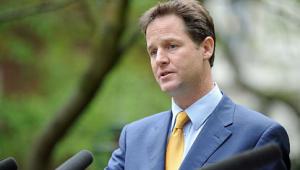By Richard Johnstone | 15 November 2013
Twenty-eight cities in England are to share a £50m fund to develop local programmes to tackle youth unemployment, the government has announced.

Under a three-year programme revealed by Deputy Prime Minister Nick Clegg and cities minister Greg Clark, the eight core cities that have reached City Deals with the government, and the 20 other areas currently doing so, will be given extra responsibilities.
It is intended that locally devised back-to-work programmes will help more than 25,000 people into jobs.
Among the schemes, the single largest award is £5.9m to the Liverpool City Region. This will be invested in a new payment-by-results scheme targeted at helping the most disadvantaged young people into work.
Other large awards, which come from the government’s youth contract fund, include £5.8m to Greater Manchester to provide personalised training for people aged 18 to 24 and a local transport-to-work guarantee.
In addition, £5m will be provided to the Sheffield City Region to offer intensive advisor and mentor-led support for young people, and £4.6m to Leeds to provide intensive support for those at risk of long-term unemployment.
The councils have had to prove they will be able to deliver innovative schemes explicitly designed to tackle the problem of youth unemployment, Clegg said yesterday. The cash will be used to provide young unemployed people with the skills to meet the needs of local employers.
‘This is a multi-million pound cash boost for the future prosperity of our young workforce and, making our society fairer so that everyone has the chance to get on in life,’ Clegg said.
‘Investment like this, paired with a determination to tackle youth unemployment by our great cities, has the genuine power to change the fortunes of young people across the region, whether it’s with extra training, improving education or apprenticeships.’
Clark insisted that the days of Whitehall holding all the purse strings are coming to an end.
‘Handing power over how cities spend money is important – this way, local leaders can do what’s best for the young people in their area. They know what will work and can make a real difference to their economic future by shaping the workforce of tomorrow.
‘The government is committed to making long-term investments in young people’s futures through work experience and apprenticeships. It places cities at the centre of the design and delivery of new schemes to complement the government’s existing investment to tackle youth unemployment.’
Responding to the announcement, the chair of the Local Government Association’s Economy and Transport Board Peter Box called for all local areas to be able to tailor support for the unemployed.
‘Councils are united in their commitment to support young people and this is an acknowledgement that councils and local partners are best placed to help young people into work,’ he said.
‘Although we recognise this as a positive step for many places, we now must ensure that all local areas are able to ensure services meet the needs of young people and local employers.
‘The government invests around £15bn in young people each year, but the current national system is highly centralised and complicated with 35 different schemes spanning 13 different age boundaries. Evidence suggests a devolved approach could reduce youth unemployment by 20% in three years and save the taxpayer £1.7bn each year.’






















